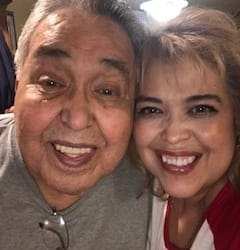I adore my dad and am grateful for his service. To me, this is a small but significant way to show my love and appreciation he has made for his family as well as the nation.
What are you most excited to do as a Dole Caregiver Fellow?
I am excited to be able to bring awareness and be a voice for military/veteran caregivers. Often, while the veteran is the focus, what happens to the veteran absolutely affects the caregiver just as much. The caregiver tends to think they ‘just’ play a support role when in fact, they truly carry so much more on their plate. I want to ensure caregivers know they have a safety net to fall back on and to offer available resources and support services for the caregiver and veteran for the challenges they may be facing.
At what moment did you realize you were a military caregiver?
I never saw myself as a military caregiver until I was nominated to be the Hidden Heroes spokesperson for El Paso County. I questioned it at first but the person who nominated me had already seen me at the VA several times with my dad and had seen/heard how much interaction I had with VA staff and medical professionals while advocating for my dad. He made me realize that I was not just a daughter, but a caregiver as well.
What is one piece of advice you would offer to other military and veteran caregivers?
The most important advice I can offer to caregivers is to absolutely speak up and advocate on behalf of the veteran, as well as yourself! Only you know if something is off or needs to be addressed before it becomes a more complex issue. Do not be afraid to use your voice if you are not heard the first or even the second time!

My Story
Linda’s father Joe served in Vietnam in the Air Force before she was born. While she was growing up there was one rule she didn’t understand until she was an adult: do not ever wake Dad up abruptly! It wasn’t until 2019, when she started to help her dad with documentation to receive his 100% disability rating that he was diagnosed with post-traumatic stress disorder (PTSD). Suddenly, Linda made the connection between her childhood memories of his anger and panic to his PTSD. Listening to her dad’s stories and identifying his triggers made Linda realize that PTSD never goes away.
Linda started taking her dad to his doctor and counseling appointments and making sure his doctors knew exactly how he was feeling, knowing his generation is typically reticent about discussing their physical or mental health issues. She also advocates on his behalf for continued care and necessary treatment. She feels honored to care for her dad and sees it as an opportunity for them to spend more time together. Linda is able to care for her parents with the help of her family, especially her older children who step in to help drive to appointments or run errands.
In addition to caring for her dad, Linda helps care for her mom and her brother, an Army veteran. She is also the mom of four children and has one grandson, five dogs, and two cats. Linda also has her own health challenges due to a work-related injury from her career in law enforcement but feels that her busy schedule helps her manage her own pain.








